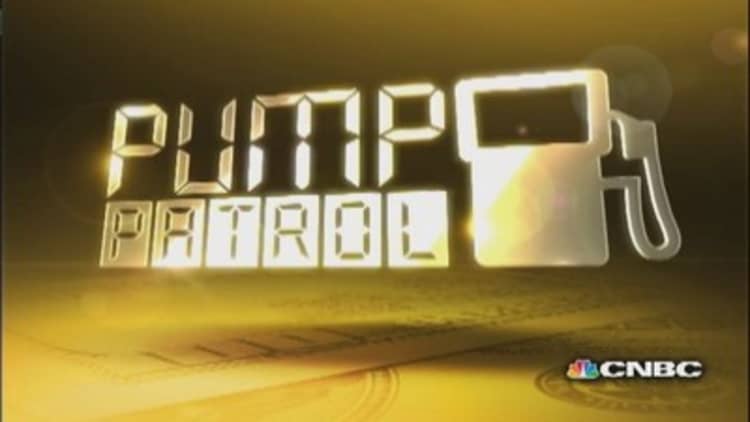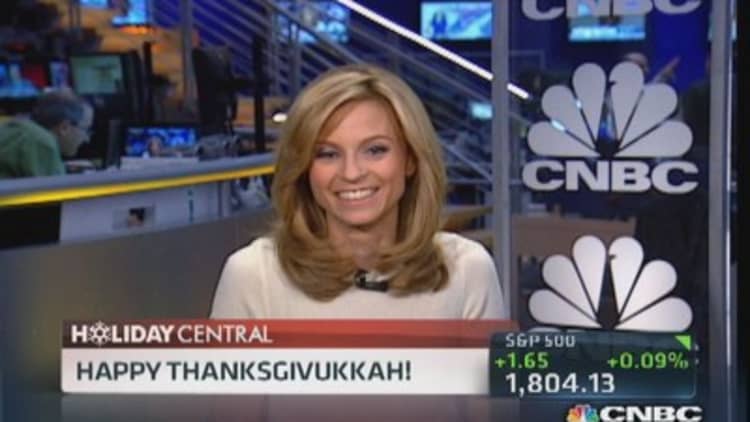No one begs Santa Claus for cheaper gasoline. Yet falling gas prices are shaping up as an unexpected gift for drivers—and for people on their holiday shopping lists.
The average price of gasoline has tumbled 49 cents from its peak this year to $3.29 a gallon, putting it on track for the lowest average since 2010, according to AAA. Because many Americans have had no pay raises, whatever money they're saving on gas has freed up a bit more for other purchases.
And history shows that when gas prices drop, consumers become more likely to splurge on dinners out. Impulse buys at the mall seem like less of a stretch. More people buy a gas-station gift card after fueling up.
(Read more: Chart of the Day: Airlines losing HOW MUCH today?!)

Many retail analysts have forecast a ho-hum sales gain of around 2 percent this year; others predict an increase of up to 3.9 percent. But steadily cheaper gas could send holiday sales shooting above 5.4 percent, analysts say.
Every little thing moves the needle at this point," said Carl Riccadonna, senior U.S. economist at Deutsche Bank. "The benefit at this time of the year certainly helps retailers, since it is not spread evenly throughout the year."
Tom Kloza, chief oil analyst at the Oil Information Service, foresees the average price drifting down, as it typically does this time of year, to as low as $3.05 by year's end.
For retailers, the best-case scenario would be for the national average to breach $3 a gallon, a psychological barrier that could help accelerate spending.
(Read more: IRS has message for tea party, Koch bros. and unions)
Cheaper gas could help build on the momentum of 2 million more Americans finding jobs this year. It might also help shore up consumers' fragile confidence in an economic recovery that's lumbered along for 4 1/2 years.
Riccadonna estimates that breaking $3 gas would lead the average shopper to spend $47 more over the holidays. That figure would translate into $15 billion worth of extra shopping - possibly the difference between lukewarm and red-hot sales growth.
Prices briefly dipped below $3 in five states—Arkansas, Kansas, Missouri, Oklahoma and Texas—before rising above that threshold again.
Some service stations have been charging less than $3 around Tucson, Ariz., where Seth Nilson, a high school teacher, and his wife, Cristi, are enjoying more time at restaurants.
"We have definitely gone out to eat more lately," Nilson said. "She tends to cook less when gas prices are low."
Many consumers think of gas prices in 50-cent increments, said Britt Beemer, head of the consumer behavior consultant America's Research Group. Based on his firm's research, shoppers would spend more freely if gas settles below $3 or $2.50. They would likely step up purchases at grocery stores or spend $35 on a gift instead of the $25 they might have planned, Beemer said.
"A 10-cent drop doesn't really change the equation much," Beemer said.
Still, smaller declines in gas prices matter, too, even if they don't register as clearly with consumers.
Economists say lower prices disproportionately benefit lower- and middle-income consumers who must commute to work. Cheaper gas makes their trips more affordable and provides the equivalent of a tax refund that frees up spending money.
Given the still-sluggish economic recovery, many shoppers are expected to tilt toward practical gifts, like gas station gift cards, said Pam Goodfellow of Prosper Insights & Analytics, who polled consumers for the National Retail Federation.

Her survey found that the average gift card this year is expected to be worth $45.16, up from $43.75 a year ago—for a rough total of $1 billion more. Twelve percent of shoppers say they intend to buy gas station gift cards this year, compared with 9.3 percent in 2010.
The potential economic boost comes at a low point for consumer confidence. Confidence was battered by the partial government shutdown and the troubled launch of President Barack Obama's health care law, which led insurers to cancel coverage for millions.
(Read more: Retailers exporting this US staple: Black Friday)
Many major chain stores have acted aggressively to generate sales. Macy's will open on Thanksgiving night for the first time in its history, while Wal-Mart kicked off its usual Black Friday discounts a week before the holiday.
More consumers have not only been turning to Internet retailers like Amazon.com. They've also been browsing store websites ahead of time so they'll need to make fewer stops at the mall. But this year may bring a wrinkle: Falling gas prices tend to cause consumers to drive to brick-and-mortar stores more frequently, increasingly the likelihood that they'll expand their shopping lists.
"They become less surgical in their shopping behavior," said Bill Martin, executive vice president of retail analyst ShopperTrak. "That opens the door to more impulse buying."
Lower gas prices also tend to encourage a big-ticket purchase that a growing number of Americans make during the holidays: cars. Steep discounts and aggressive advertising helped sales increase 9 percent last December to more than 1.3 million, up from an 8.7 percent increase in 2011, according to Autodata Corp.
Market data tracked by Edmunds.com found that the share of SUVs, crossovers and trucks sold has ticked up a few percentage points to 18 percent or more in December, compared with as low as 14 percent in spring, when gas prices usually spike.
Edmunds.com chief economist Lacey Plache expects a slightly more modest increase this December. But she said auto dealers are adopting the same strategies as big box retailers eager to lure customers at year's end.
"We've seen the rise of the whole Black Friday phenomenon," Plache said. "There's this mentality that all the good deals are available in the latter part of the year."
Many consumers also know that lower gas prices this time of year are usually short-lived. So holiday-time spending typically provides a temporary lift, a short-lived chance to enjoy a new restaurant or buy another stocking stuffer.
"Now, if gas went to 99 cents a gallon," said Allena Portis, an accountant in the San Francisco area, "that would mean something."
—By The Associated Press


